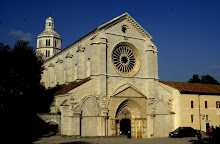John Cassian famously declared that, like a hunter’s bow, the hermit must not remain taut: just as a bow must be unstrung to retain its flexibility, so must the holy man relax at times to retain his spiritual suppleness. Benedict had structured leisure time into daily life in his Rule, and periods of recreation and ludi were allowed in the constitutions and traditions of every order. However, recreation could also be abused, licit leisure transformed into acadia and idleness; this problem was compounded by scholastic debates over the moral problems of leisure activities. (When was play a virtue? When a vice?) Institutional attempts to regulate recreation similarly reveal a tension between strict interpretations of the orders' rules and more permissive attitudes toward food, conversation, enclosure, and even vacation time.
In keeping with the IMC 2013 theme of “Pleasure,” Communis: The Consortium for Medieval Monastic Studies seeks to organize a session on recreation in professional religious life. To that end, we solicit proposals on any aspect of rest, leisure, and recreational activities within the religious orders. Possible topics might include
- Licit and/or illicit pastimes within or across the orders
- Daily leisure and/or "special occasion" festivities (e.g., festivals, dramas, musical performance, royal visits)
- Extended retreats at granges or hermitages
- The carnivalesque in religious recreation
- The relationship between lay pastimes and those of the religious orders
- The use of space (e.g., cell, cloister, garden, countryside) in restorative activities
- The gendering of leisure activities and/or differing regulations for nuns vs monks, canons, and mendicants
- Literary representations of monastic or mendicant leisure
- The perceived benefits to health, emotional well-being, and/or communal harmony of regular recreation
Seeking to broaden the study of medieval religious life by placing scholarship on different orders, regions, and eras in dialogue, we are particularly interested in projects that cross traditional scholarly boundaries or that invite comparison among the orders.
Please submit 100 word abstracts, by 10 September 2012, for 20 minute papers (via email, as Microsoft Word or PDF documents) to Cynthia Turner Camp, Assistant Professor of English, University of Georgia (ctcamp at uga dot edu).

No comments:
Post a Comment